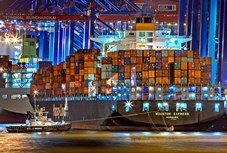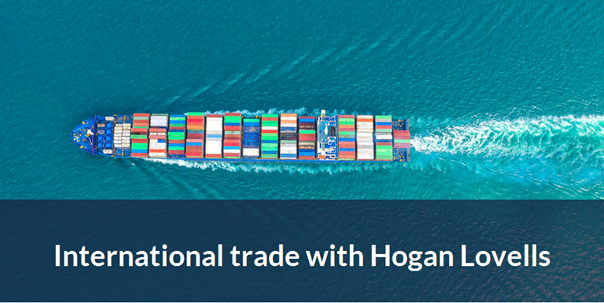In a nutshell
 The work of international trade lawyers is split between two main areas: the application of domestic law to international trade, and treaty-based international law governing trade flows. On the domestic side, work covers export controls, embargoes and economic sanctions, import relief actions such as antidumping, countervailing duties and safeguards, and customs classifications, valuation and rules of origin matters. In relation to international treaties, attorneys advise on World Trade Organization (WTO) rules, preferential trade regimes such as the North American Free Trade Agreement (NAFTA) and bilateral investment treaties (BITs).
The work of international trade lawyers is split between two main areas: the application of domestic law to international trade, and treaty-based international law governing trade flows. On the domestic side, work covers export controls, embargoes and economic sanctions, import relief actions such as antidumping, countervailing duties and safeguards, and customs classifications, valuation and rules of origin matters. In relation to international treaties, attorneys advise on World Trade Organization (WTO) rules, preferential trade regimes such as the North American Free Trade Agreement (NAFTA) and bilateral investment treaties (BITs).
Lawyers advise on the implementation of these domestic and international rules, and counsel clients in disputes related to their violation. Clients include US organizations doing business in foreign jurisdictions and foreign businesses operating in the USA; they include major corporations, trade associations and national and regional governments.
What lawyers do
Domestic
- Lawyers represent clients before the International Trade Commission (ITC) and the Department of Commerce (DOC), the two main bodies that review petitions related to import laws. They are the first port of call for disputes and protests related to issues such as dumping, countervailing duties and safeguards.
- The first port of call for protests over customs classifications, valuation and rules of origin matters is US Customs and Border Protection (CBP).
- Lawyers assist US companies to secure a license from the DOC for the export of 'dual use' goods (with both military and commercial applications), or from the Department of State for the shipment of military goods.
- They also assist clients before the Treasury Department’s Office of Foreign Assets Control (OFAC), which administers and enforces economic and trade sanctions against targeted foreign countries, terrorism-sponsoring organizations and international narcotics traffickers.
- Parties can protest determinations made by the ITC, DOC and CBP at the Court of International Trade. This court also hears protests against trade-related worker assistance decisions made by the Departments of Labor and Agriculture.
- Antidumping duties are imposed on imports to combat ‘dumping’– selling a product in an export market at a price less than its home market value, which injures a domestic industry.
- Countervailing duties are similar to antidumping duties, but are imposed by a country to counter the effects of subsidies in foreign markets.
- Safeguards are ‘emergency’ measures in response to an unforeseen increase in imports which damages or threatens to damage a specific domestic industry. Unlike ‘unfair’ activities like subsidies and dumping, increased shipments by themselves are not deemed to be unfair, so safeguards must be applied in a nondiscriminatory fashion.
- Section 337 of the Tariff Act of 1930 provides an alternative to US court actions to challenge imports that infringe patents or other intellectual property rights. These cases are dealt with by administrative law judges in the ITC.
- Lawyers also assist companies involved in an acquisition of a US target under review by the Committee on Foreign Investment in the United States (CFIUS). Established in 1975, CFIUS (pronounced ‘sifius’) is tasked with reviewing the national security implications of investment in US assets.
International
- On the treaty side, trade lawyers practice “global regulatory law,” according to Andy Shoyer, partner and cochair of Sidley Austin’s international trade and dispute resolution practice.
- Disputes are the largest source of work. The WTO is the main international arbitrator of trade disputes. Its Dispute Settlement Body makes rulings on agreements made between member states under WTO negotiations. Only sovereign states can bring disputes to the WTO so lawyers for private stakeholders will be involved in lobbying governments to bring cases or in assisting to defend them.
- Neither the US government nor the EU hires outside counsel to represent them in front of the WTO, so US attorneys often find themselves representing other nations, such as Brazil.
- Disputes relating to BITs are heard in arbitral tribunals administered by the International Centre for Settlement of Investment Disputes (ICSID), an arm of The World Bank, or similar arbitration centers.
- Treaty-focused attorneys will also engage in lobbying to influence the development of new international rules. “We listen to what companies tell us about the regulatory barriers they face and translate that into potential treaty language. Then we will help businesses affect the negotiations within the US and internationally,” Andy Shoyer explains.
Realities of the job
- F Joseph Warin, partner and chair of the Washington, DC litigation department at Gibson Dunn, advises: "Adventurousness and a willingness to take risks are necessary in this practice. If you're dealing with, for instance, stock options in Norway, you need a sense of intellectual curiosity to understand and process all this and then give advice that's nuanced to the environment. Cultural sensitivity is a must. Being a good listener is imperative. I urge young associates to be keen listeners and not to leapfrog that step because it's absolutely essential in order to give good solid advice."
- International trade work is often closely tied to headline-making current events, and associates grapple with key policy as well as legal issues.
- One associate who works in an international trade department told us: “I had focused on international studies throughout college and demonstrated an interest in international trade.”
- “Unlike domestic litigation we don’t have substantial document production and discovery work in WTO or other treaty disputes,” Shoyer informs us. “That saves junior associates from some of the drudge work. But that doesn’t mean that lawyers don’t have to get on top of the facts! Arbitrations can involve hundreds of pages of documents and younger associates will get involved in that.”
- "International trade practices with a significant policy focus tend to be partner-heavy because clients demand high-profile advice,” Shoyer explains. "It’s hard to generate the knowledge base required just by reading the case law: you need to have the experience. You build up your knowledge base slower.”
- Trade lawyers need to be politically aware and keep track of negotiations at the WTO and other multilateral, regional and bilateral regimes. Joe Dorn former partner at King & Spalding says: “Many WTO cases are very intellectually challenging. You're often covering new ground, so that's very stimulating.”
- Andy Shoyer tells us: “The greatest challenge and joy in this area is that you are really practicing the law of globalization. You're at the forefront of those business and policy forces that drive the world. Anyone in this practice needs to appreciate that the nexus of law and policy is very important.”
- Shoyer adds: “While the ability to work comfortably in several languages is so helpful, a fluency with culture is vital. You need to be comfortable putting yourself in the shoes of someone from another culture. Creativity and openness is a must, perhaps more so than in any other area of the law because it's still emerging.”
- F Joseph Warin says: "I’m constantly globe-trotting. I'll go to London, then Abu Dhabi, then two weeks later I'll be in New Delhi. It's fascinating but it also keeps me away from my family, so this big plus is also the biggest negative."
Current issues
Learn about the current issues from the lawyers who face them...
June 2018
- International trade laws increasingly intersect other regulatory frameworks and cut across multiple borders, which makes compliance challenging. Beth Peters of Hogan Lovells informs us that “typically regulations within the US, EU, UK and other regions may be triggered simultaneously when trade issues arise, whether that's in international trade litigation or in international trade compliance matters. Some examples are export controls, sanctions, anti-money laundering, cybersecurity and securities reporting regulations.”
- The Trans-Pacific Partnership (TPP) – currently held between Australia, Brunei, Canada, Chile, Japan, Malaysia, Mexico, New Zealand, Peru, Singapore and Vietnam – was thrown into disarray when the United States withdrew in 2017. Though a partial agreement was put together by the remaining members, the viability of the proposals without US involvement has been called into question.
- US sanctions on North Korea have been strengthened and expanded recently. In September 2017, President Trump signed an executive order permitting the freezing of any assets, organizations or individuals trading with North Korea. Further sanctions were ordered a month later.
- In June 2017, President Trump suspended various aspects of the deal reached with Cuba by the Obama administration; however, diplomatic relations remain open and new policies are being formulated.
- Brexit will completely change the legal basis of Britain's trade links with the world. “This is an area that requires complex study,” Peters tells us, as “the USA and Britain have a very close trade and national security relationship.” Future developments will depend heavily on the negotiations between the UK and EU and the nature of its future relationship: if the UK exits the EU customs union (as the Government intends to) it will be able to negotiate independent trade deals around the world, but doing so could jeopardize its preexisting trade ties.
- Matthew Nicely of Hughes Hubbard & Reed stressed that “there's always a lot of focus on the origin of goods imported into the United States. This is true with all products, but particularly those that have been subjected to antidumping or countervailing duty cases, which inevitably lead to allegations of transhipment.” In the recent past the most frequent target of antidumping and countervailing duty cases was China, but recent cases include "multiple other countries, including Korea, Japan and Turkey, and others, particularly as the US steel industry has resumed its heavy use of this kind of import relief."
- Increasingly, both US and foreign clients are becoming more aware that nations outside the USA also have complicated and important trade laws. Beth Peters highlights that “we've certainly experienced clients addressing trade issues in Singapore, Brazil and India,” in particular.
- India canceled investment treaties with more than 50 states in 2017, fearing they left too much room for international arbitration disputes – a serious undertaking for one of the fastest-rising economies globally. New treaty terms proposed by India to reduce the potential for international arbitration claims have so far left investors from other countries wary.
- Across the globe, World Trade Organization figures reveal that world merchandise exports have increased in value by more than 30% since 2006, with commercial service exports increasing at more than twice that rate.
- Export control and trade compliance are becoming an increasingly busy area due trade control being seen as a means to exert geopolitical influence. David J.Levine of McDermott Will & Emery explains: “In a broader sense, there is a tendency, as our election made clear, for countries to become more insular and retract from global trade deals. No one really knows what exactly will happen with the incoming Trump administration, but people are watching carefully as trade was highlighted during the campaign, and Trump is still talking about how to implement some of the issues he campaigned for.”
